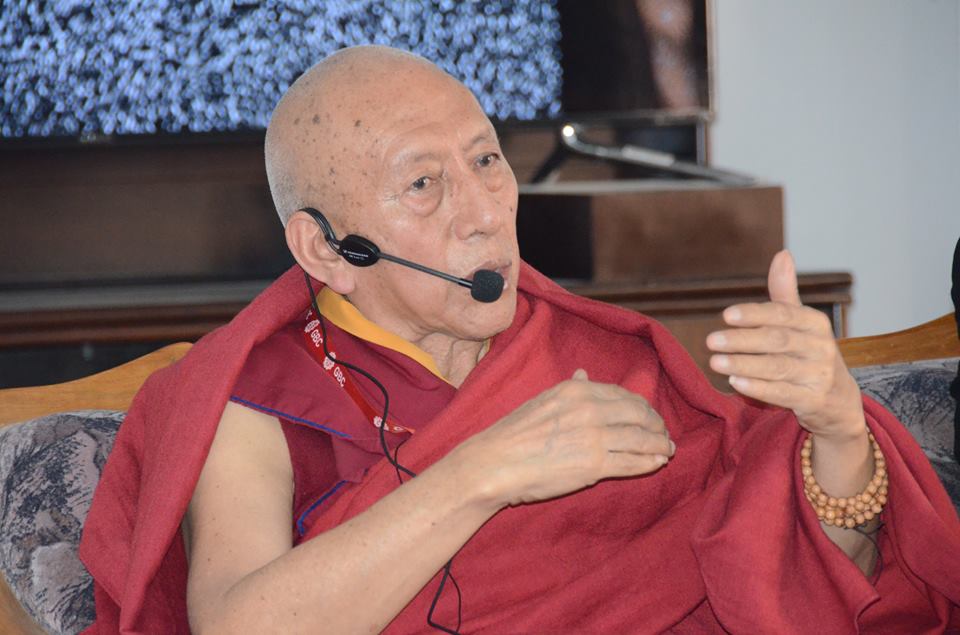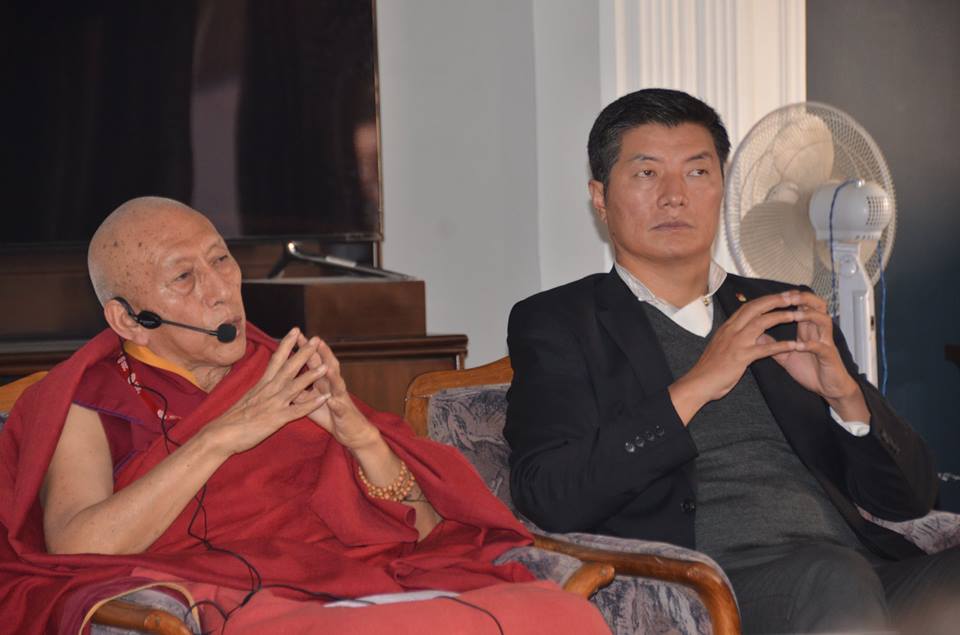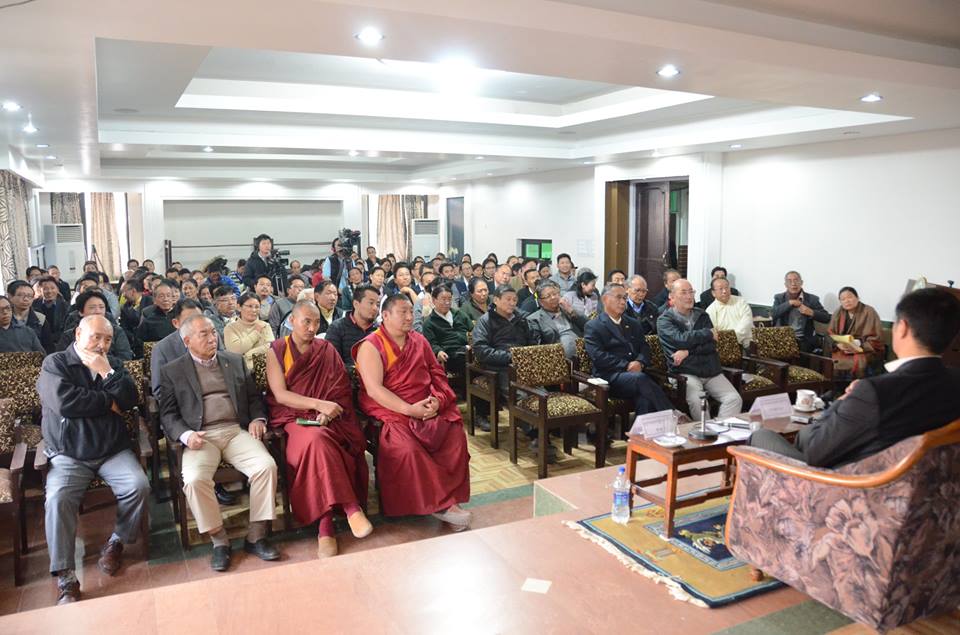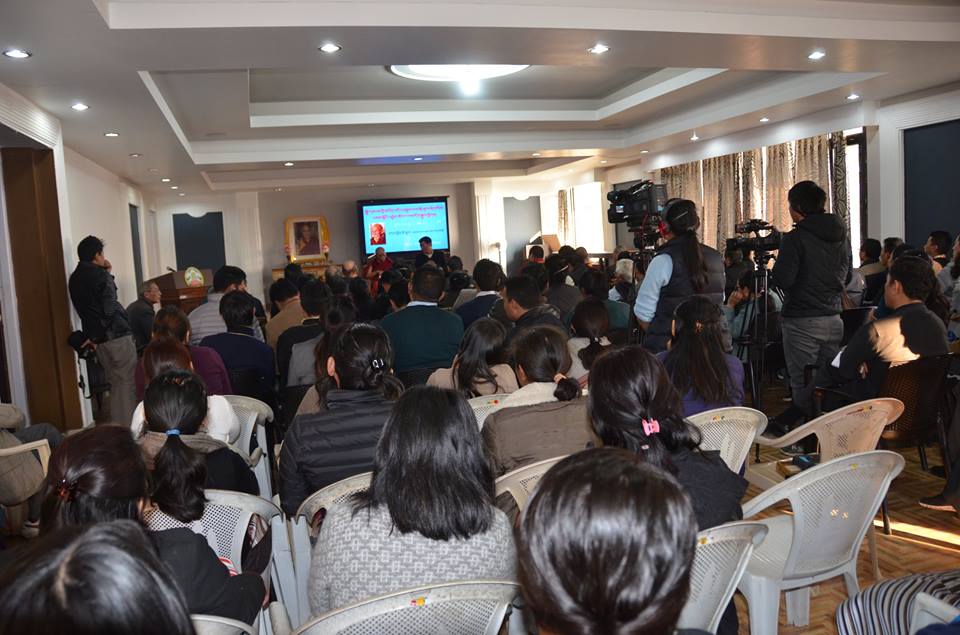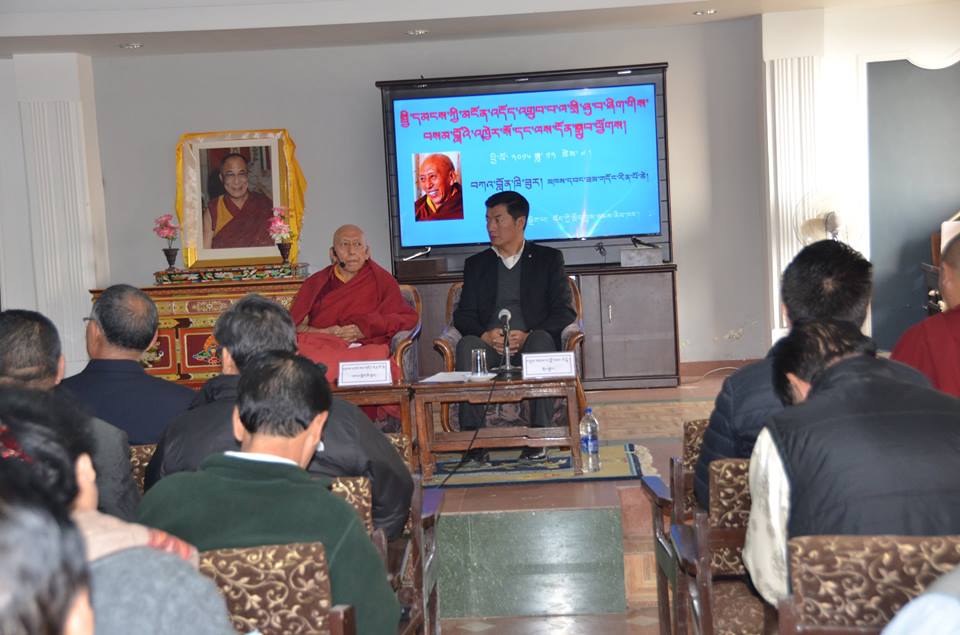An advisory talk to the staff of the Central Tibetan Administration, Gangchen Kyishong
In the afternoon of 7 December 2016, at the request of Tibet Policy Institute, Dharamshala, His Eminence Prof. Samdhong Rinpoche gave an advisory talk, on the theme of “Mental Attitude and the ways of carrying duties by a civil-service person in fulfilling the aspirations of the general public,” to the staff of Central Tibetan Administration, in Nyatri Hall, Gangchen Kyishong, Dharamshala.
Organised by Tibet Policy Institute, and presided by the Honourable Sikyong, Dr. Lobsang Sangay, the session began with an introduction, by Mr. Tenzin Pema, of Tibet Policy Institute, on His Eminence Prof. Samdhong Rinpoche’s life contributions.
His Eminence Prof. Samdhong Rinpoche began the advisory talk with the remarks:
“The theme, ‘Mental Attitude and the ways of carrying duties by a civil-service person in fulfilling the aspirations of the general public,’ comprises of five sub-themes: the general public, aspirations, civil-service person, mental attitude, and ways of carrying duties.Actually, it would take several days with each of the sub-themes…(laughter); yet, as the modern civilization is characterised by the three attributes—big size, speediness and optimum reach—I will accordingly cover each of the sub-themes in a few minutes, presenting my views.
“The general public—proletariat—is a word used mostly by Marxists and Communists, because “general,” spyi, refers to the system, Socialism; and “the public,” dmaṅs, when written as maṅ, includes all people. But in Communist ideology, what is included is only one class. By dividing into many classes—the industrial class, the peasantry class—or specifically referring to the oppressed class as the ‘proletariat,’ ‘democratic totalitarianism,’ ‘dcig-sdud dmaṅs-gtsoḥi riṅ-lugs,’ is the term used, not as ‘dcig-sdud maṅ-gtsoḥi riṅ-lugs’. That is, it is totalitarian where the proletariat is chiefly important. The human society is divided into many classes, and class struggle is waged, and through class struggle all upper classes are destroyed, and again further dividing into class takes place within the remaining populace, and akin to peeling off layers of onions, class struggle is carried out continuously until nothing is left. It is a Marxist thinking that class divisions is made extinct through class struggle.
“In the past, we Tibetans used to employ the word dmaṅs-gtso (proletariat paramountcy) for maṅ-gtso (Democracy; public paramountcy). In Tibetan society the terms ‘rje,’ ‘lord,’ and ‘dbaṅs,’ ‘subject,’ were in use from the ancient times; in actuality, the best word in Tibetan for a society of people is yul-mi; it is convenient if used. A territory with an administration of the combination of sovereign and subjects, with territory borders, with a sovereign, with subjects, and a relation existing between a sovereign and subjects—is called a nation state.
“The present situation of our society is one not only of great changes taking place politically and economically, rather changes are happening in all spheres: our thoughts, principles, and world view. It is difficult for us to know about society, also it is difficult to know society’s aspirations; we need to know these problems.
“Servicer, sri-zhu-wa, one who serves, (‘civil-service person’) is a good word. This word has been in Tibetan vocabulary from remote past. Yet, the situation to which it is to be applied is different between that of the past and the present. In the past, in Tibet, when mentioning ‘gzhuṅ-zhabs sri-zhu-wa,’ government service-person, the government was to whom the service was to be done, and those who served were the gzhuṅ-zhabs, government service-personnel. These days, to whom the services are done is not the government, it is the public, the society. If the service personnel are the ones who serve the public, then the society which one serves is to be the one from where they need to seek the fields of their trust and service.
“Since serving of the society is being done through an administration, that administration, for the exile Tibetan society, is the Central Tibetan Administration. Whom one serves is the public; the medium for the service is the Central Tibetan Administration. If works are carried out through a clear and correct relation between the two, there would be a genuine ‘service personnel,’ the term and the actuality resembling each other.”
His Eminence Rinpoche further advised:
“What kind of service person one becomes depends on what type of objectives one retains in one’s mind, and for what purpose one retains the objectives. With the mental attitude, there are two stages: causal motive, and the location motive, the motive at the time. The first stage of thought, which is the causal motive, is for example, with what kind of motive one initially entered the service, which is the most important. Initially, whether you were requested by others, or you have applied for by yourself, if at that time you had the motive to serve the society, for the welfare of the humanity in general, and entered the service thus, your motive is a correct motive.
“The location motive, which is the second stage of thought, is the motive at the time of service, to keep worthy motives, to be able to go on the path of honesty and truth, and with the thought solely for others’ welfare, not of self-interest. ‘I want salary, a good place to live, good livelihood’—if one thinks one is doing the works for those self-interests, although it is the same work one is doing, the value or the lack of it of the work changes immensely due to the mental attitude. If one thinks, ‘This is a work for the society, it is for the benefits of the six million Tibetans, and through that, for the welfare of humanity in general, I will do it well, the factors for my livelihood will come about on the side anyway in my carrying out of the duties,’ it becomes a correct, perfect mental attitude. ‘This is my duty, through this service, I would as well accomplish my own welfare of this and next lives’—thus if one carries the service with enthusiasm, one would not feel any hardship.”
On the mode of managing the service of the Administration, His Eminence Prof. Samdhong Rinpoche gave the advice:
“The service personnel have to see through the continuity of the works, and the executives have to exert efforts in innovation. Not only there is the continuity, and the maintaining of the continuity, there has to be within the continuity innovations which are necessary. That is to be the way of pooling in efforts by the executive who are for a definite duration of term/s, and the service personnel who stay for the entire duration of their service.
“In summary, all—the leaders and the service staff—are doing their work for the society, through the Administration. As such, a thing that is indispensably needed for that is, the relationship between the public—whom one serves—and yourself the server, and between the leaders who guide and the service staff; this is so valuable.If there is the compassionate intimacy between those who are at the top and those who provide the services, there would not be the situation of communication problems. When there is not the problem of communication, the problem of not getting the messages well-understood by both sides, the chances for defects in works would vastly decrease.
“For such to come about it is very important that there is no disruption towards differences in opinions as regards the works, and the personal situation of a person. If there are mistakes made in teamwork of the Administration, there should not be animosity towards the concerned individual; if those at the top have erred, those below should be able to say, ‘The way I see it, I see this as a mistake; the reason this is wrong is because of this…’; and if those below do wrong, it needs to be pointed out; if it is not a thing done wrong, the concerned person should certainly be given the opportunity to explain the reasons that it is not done wrong. If there is such a relationship then there would be a close interpersonal relationship, and a great difference of there not arising a situation of two different narratives: one to say in front of a person and the other behind the person.”
These and other insights were presented in great detail.
At the end of the session the Honourable Sikyong thanked for the advisory talk. Those who attended the talk comprised of the Central Tibetan Administration’s Justice Commissioner, the Cabinet Ministers, Members of Parliament, the department Secretaries, and staff members.
